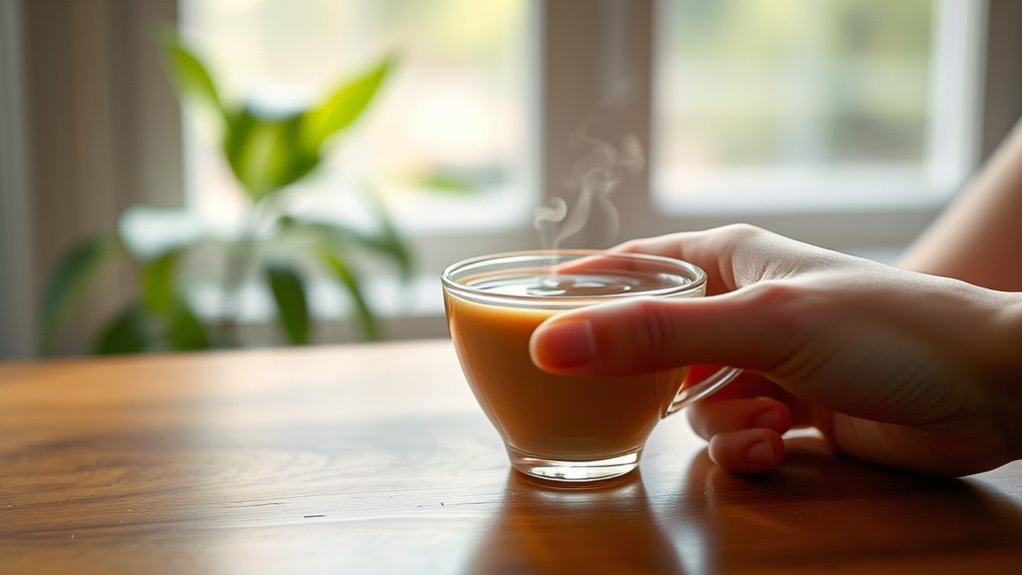Micro-reflection moments boost decision quality by helping you pause and become aware of your thoughts and feelings. This simple practice reduces biases, clarifies priorities, and sharpens your intuition. By taking brief breaks, you can identify hidden assumptions, regulate emotional reactions, and make more thoughtful choices aligned with your values. Incorporating these small reflections into your daily routine can lead to more confident, balanced decisions; explore further to unleash even greater benefits.
Key Takeaways
- Micro-reflections increase awareness of thought patterns and biases, leading to more objective decision-making.
- Brief pauses allow emotional regulation, reducing impulsiveness and enhancing thoughtful responses.
- Recognizing subtle cues during micro-reflections helps clarify priorities and align choices with core values.
- Regular reflection fosters intuition development, improving confidence and accuracy in decision outcomes.
- Incorporating micro-reflections into routines strengthens self-awareness, leading to more deliberate and balanced decisions.
The Power of Brief Pauses in Decision-Making

When faced with a tough decision, taking a brief pause can make all the difference. During this moment, you give yourself space to enhance your intuition development and emotional awareness. Instead of rushing, step back and breathe, allowing your instincts to surface clearly. This pause helps you process your feelings and recognize subtle cues you might overlook in the heat of the moment. By cultivating this habit, you strengthen your ability to trust your gut, making more confident choices. Remember, even a few seconds of mindful reflection can clarify your priorities and reduce impulsiveness. Over time, these micro-reflections build a sharper sense of self-awareness, empowering you to make decisions rooted in both emotion and reason. Small pauses lead to more thoughtful, balanced outcomes, and practicing mindful decision-making can further reinforce this beneficial habit.
Recognizing Cognitive Biases Through Micro-Reflections

Recognizing cognitive biases requires more than just awareness; it demands intentional reflection on your thought processes. Micro-reflections help you identify heuristic traps, like mental shortcuts that can lead to flawed decisions. By pausing briefly, you become more aware of patterns such as confirmation bias, where you favor information that supports your existing beliefs. These moments allow you to question assumptions and evaluate whether your reasoning is influenced by biases. Instead of rushing into conclusions, use micro-reflections to scrutinize your thought process, catching biases before they distort your judgment. Making this a habit sharpens your ability to recognize cognitive traps early, improving decision quality. Over time, this deliberate practice helps you develop more objective, balanced perspectives, reducing errors rooted in unconscious biases. Additionally, understanding the diversity of anime genres can broaden your perspective and challenge cognitive biases related to cultural assumptions.
Cultivating Mindfulness for Better Clarity

Cultivating mindfulness enhances your ability to see clearly amid distractions and mental clutter. By engaging in mindfulness practices, you become more aware of your thoughts, feelings, and surroundings without immediate judgment. This heightened awareness sharpens your mental clarity, allowing you to distinguish what truly matters from noise and superficial concerns. Regular mindfulness exercises—like focused breathing or body scans—train your mind to stay present, reducing impulsive reactions. When you practice consistently, you develop a clearer perspective that supports better decision-making. Mindfulness isn’t about emptying your mind but about sharpening your focus and awareness. Recognizing narcissistic traits in yourself and others can help you navigate social interactions more effectively, avoiding manipulation and fostering healthier relationships. As a result, you’re better equipped to analyze situations objectively, recognize biases, and make thoughtful choices, even in complex or stressful circumstances.
Practical Strategies to Incorporate Micro-Reflections Daily

Incorporating micro-reflections into your daily routine can be simple and highly effective. To build this habit, choose specific moments—like during breaks or after tasks—to pause and reflect. Consistency is key; over time, these small acts reinforce emotional regulation and improve decision-making. You can anchor micro-reflections to existing habits or routines for easier habit formation. Use prompts such as “What am I feeling right now?” or “What can I learn from this?” to guide your thoughts. Regular practice helps you recognize emotional triggers and respond thoughtfully rather than react impulsively. To organize your approach, consider this table:
| Time of Day | Reflection Focus | Outcome |
|---|---|---|
| Morning | Intentions | Set purpose for the day |
| Midday | Emotions | Manage stress and emotions |
| Evening | Lessons Learned | Improve future decisions |
Additionally, understanding how emotional regulation impacts your choices can deepen the effectiveness of your micro-reflections.
Real-Life Examples of Improved Choices Through Micro-Reflection

When you make micro-reflections part of your daily routine, you start noticing how small moments of awareness lead to better choices. For example, by pausing to recognize your emotional state during a stressful meeting, you can choose to respond calmly instead of react impulsively. This emotional awareness helps you stay aligned with your core values, such as patience or integrity. In another instance, reflecting on your daily decisions reveals patterns that don’t match your long-term goals, prompting you to adjust your actions accordingly. Over time, these micro-reflections sharpen your ability to make decisions rooted in genuine value alignment, leading to more consistent, thoughtful outcomes. Small moments of insight accumulate, ultimately transforming your decision-making process into a more intentional and values-driven practice. Recognizing the importance of retail hours can also help you plan your activities more effectively, ensuring you make the most of your day.
Frequently Asked Questions
Can Micro-Reflections Be Effective During High-Stress or Emergency Situations?
During high-stress or emergency situations, micro-reflections can still be effective for stress management and emergency decision making. You can quickly pause to assess your thoughts and feelings, helping you stay focused and calm. These brief moments enable you to clarify priorities, avoid impulsive actions, and make better choices under pressure. Even in urgent moments, practicing micro-reflection supports clearer thinking and more effective responses.
How Do Micro-Reflections Differ Across Various Cultural Backgrounds?
You’ll notice that micro-reflection moments vary across cultures due to different cultural nuances and reflection styles. In some cultures, people prefer silent contemplation, while others favor verbal sharing. These differences influence how you engage in quick reflections, shaping your decision-making process. Recognizing these cultural nuances helps you adapt your reflection style, ensuring more effective micro-reflections regardless of cultural background, ultimately leading to better decisions in diverse settings.
What Tools or Apps Assist in Practicing Micro-Reflection Consistently?
Imagine your mind as a garden, and tools like reflection journaling and mindfulness apps are your watering cans. These tools help you nurture your thoughts and stay grounded. Apps like Headspace or Calm guide you through quick reflection sessions, while journaling prompts spark deeper insights. By consistently using these tools, you cultivate clarity and focus, transforming everyday moments into powerful opportunities for better decision-making.
Are There Age-Specific Techniques for Implementing Micro-Reflections?
You can tailor micro-reflection techniques based on developmental stages and cognitive maturity. For younger individuals, use simple prompts or visual cues to encourage reflection. As you grow older, incorporate more complex questions that challenge your thinking and self-awareness. Recognizing your cognitive maturity helps you choose appropriate methods, ensuring micro-reflections remain effective and meaningful, ultimately enhancing your decision-making process across different age groups.
How Quickly Can Micro-Reflections Lead to Noticeable Improvements in Decision Quality?
Micro-reflections can quickly boost your decision accuracy, often within days or weeks, depending on how frequently you engage in reflection. Increasing your reflection frequency helps you recognize patterns and avoid repeating mistakes, leading to noticeable improvements in decision quality. The more consistent you are with micro-reflections, the faster you’ll see positive changes, enabling you to make better, more informed choices in both personal and professional situations.
Conclusion
By gently integrating micro-reflection moments into your daily routine, you create space for clearer thinking and better choices. These small pauses act as subtle guides, helping you navigate decisions with a touch more wisdom and calm. Over time, you’ll find your judgment becoming more refined, almost as if you’re giving your mind a gentle nudge in the right direction. Embrace these quiet moments—they’re your secret allies for making more mindful, confident decisions.









